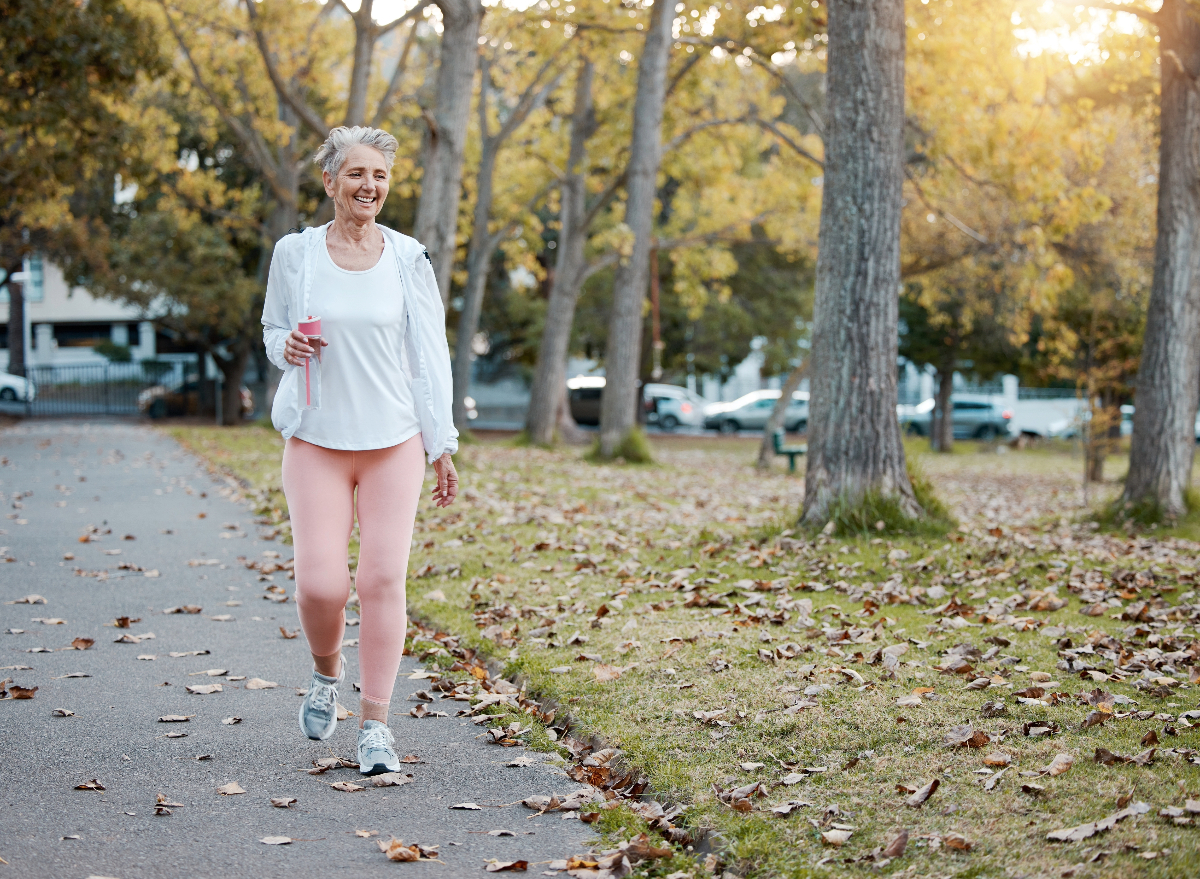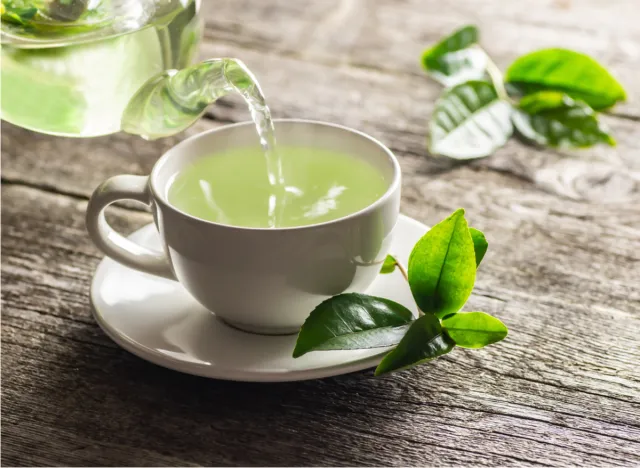9 Healthiest Morning Habits Straight From a Longevity Expert

Everyone falls into a normal morning routine that works best for them. Doing the same regimen each day is comfortable, easy to follow, and as familiar as an old best friend. But just because you're used to a daily pattern, it doesn't mean you can't use an upgrade. There are always improvements you can make that may be more restorative, energizing, and all-around healthier. Eat This, Not That! reached out to a longevity expert, Florence Comite, MD, an innovator in precision medicine with multiple specialties in endocrinology, and the founder of the Center for Precision Medicine and Health, who shares the healthiest morning habits you can follow.
We get it: Nobody likes change. But some tweaks in lifestyle can be so much better. And once you get used to them, you'll be so glad you re-evaluated! Keep reading to learn the healthiest morning habits from a longevity expert that you can easily work into your day. And when you're finished, be sure to check out This Is the New 'Magic Number' of Days You Need to Exercise To See Results, Study Says.
Establish a morning routine.

Establishing a consistent routine each morning is one of the first steps to leading an all-around healthier lifestyle. By waking up at the same time each morning—including on weekends!—you will make a big improvement. "Consistency counts," Dr. Comite says. "It'll help you sleep better because sleep loves a routine. Sleep is the new exercise. Getting enough good quality sleep is so critical for your health, brain, sugar control, and weight management. And it starts in the morning."
Clear your mind of unnecessary chatter.

It's important to give yourself a fresh start each day, and that means having a clear head. "The first thing I do when I wake up? I rest quietly whether at a hotel or home and figure out my day to absorb what I must to navigate effectively," Dr. Comite tells us. "Clear thinking and having a plan is an antidote to proactively avert stress and anxiety."
Be mindful of what's going on in your body.

Wearing something like a fitness tracker makes it easy for you to know what's going on with your body, from stress to strain to sleep patterns. You can check it first thing when you wake up and see where you may need to make any improvements.
"I wear an Oura Ring sleep tracker and a continuous glucose monitor (CGM) to monitor my glucose," Dr. Comite explains. "The CGM helps me see what happens to my carbohydrate metabolism, sugar, and insulin control based on my sleep, what I eat and drink, my stress, and activity levels. Illness will show up as higher fasting sugar, which is less worrisome than low sugar. The latter means I am likely dealing with a more serious issue [line an] infection or inflammation. I found a direct correlation between the nights when my Oura showed I got the least deep sleep and higher sugar readings on my CGM."
Get some fresh air and sunshine.

The good old outdoors works wonders on the mind, body, and soul. A little bit of sunshine and some fresh air can make you feel energized and refreshed in the early hours of the day.
"I encourage my clients to go outside and get exposed to daylight first thing in the morning," Dr. Comite says. "I habitually step outside to walk my rescue Maltese Oliver in the mornings to be exposed to light. Morning light is critical for setting our internal circadian clock. It also impacts our hunger and satiety hormones ghrelin and leptin, which helps regulate appetite. And studies show that daylight improves alertness, brain response, and cognition."
Enjoy a tall glass of water.

If you aren't already drinking a refreshing glass of water when you wake up in the morning, it's time to add that healthy habit to your routine. "You haven't wet your whistle for what, seven or eight hours? That means your body is in a dehydrated state and needs water," Dr. Comite explains. "Judge according to the color of your urine, ideally as clear as water!"
Opt for tea rather than coffee.

This really comes down to a matter of preference. Dr. Comite prefers herbal teas such as jasmine green tea due to its high content of antioxidant polyphenols. "In the cool months, I especially like polyphenol-rich hot dark chocolate," she adds. "Polyphenols eliminate reactive oxygen species that instigate illnesses of aging. Cocoa flavan-3-ols, found in dark chocolate for example, have been associated with decreased risk of heart attack, stroke, and diabetes. Polyphenols have positive effects on blood pressure, lipids, insulin resistance, and inflammation."
Have a protein-filled breakfast.

Protein is chock-full of health benefits, so working it into your daily breakfast is a great choice. And if you aren't a big eater in the morning, don't fret! Dr. Comite isn't, either, and opts for protein shakes.
"Protein is satiating and it's critical for building muscle," she says. "It keeps me full and prevents me from snacking on sugary carbohydrates. In fact, I recommend eating a small amount of protein before every meal and snack—a handful of walnuts or almonds, a bite of cheese, a piece of leftover turkey breast, healthy breakfast meat, or tofu and hummus. Protein before carbs slows the absorption of sugars into the bloodstream; insulin follows more gradually with a reduction of the post-carbohydrate insulin surge."
Exercise.

Working out in the a.m. gets your body up and moving and gives your metabolism a solid boost. "It's a proven mood lifter and improves mental clarity," Dr. Comite adds. "If you schedule exercise for the first thing in the morning, you won't miss workouts due to distractions and commitments during the day. Take one to two Arginine + Citrulline supplements to boost blood flow and increase the growth hormone surge that happens with exercise."
Choose just the right supplements.

That gets us into our final healthy morning habit: Take supplements! "I won't forget to take specific supplements if I take them in the morning," Dr. Comite tells us. "Some can be taken fasting while others demand food, such as a healthy fat for absorption. That's critical. I take omegas, D3, and K2 daily with my shake or at night after dinner. Others may be daily or weekly to support metabolism, gut and brain health, and reduce inflammation. I also take a dietary supplement derived from a Chinese herb root called Astragalus that studies suggest can help maintain and lengthen telomeres, the end caps of chromosomes that naturally shorten with age. The compound is called TA-65. My eyes, skin, and hair have benefited."
Since she touched upon fasting, Dr. Comite points out she usually fasts on a daily basis since she doesn't eat until 12 p.m. or 1 p.m. "It's the way I've always felt and done well," she explains. "Nevertheless, intermittent fasting is not a fit for everyone. Some of my clients cannot tolerate fasting and will faint or feel weak. Their biomarkers reveal if that's happening. Others have particular DNA that doesn't support fasting."









